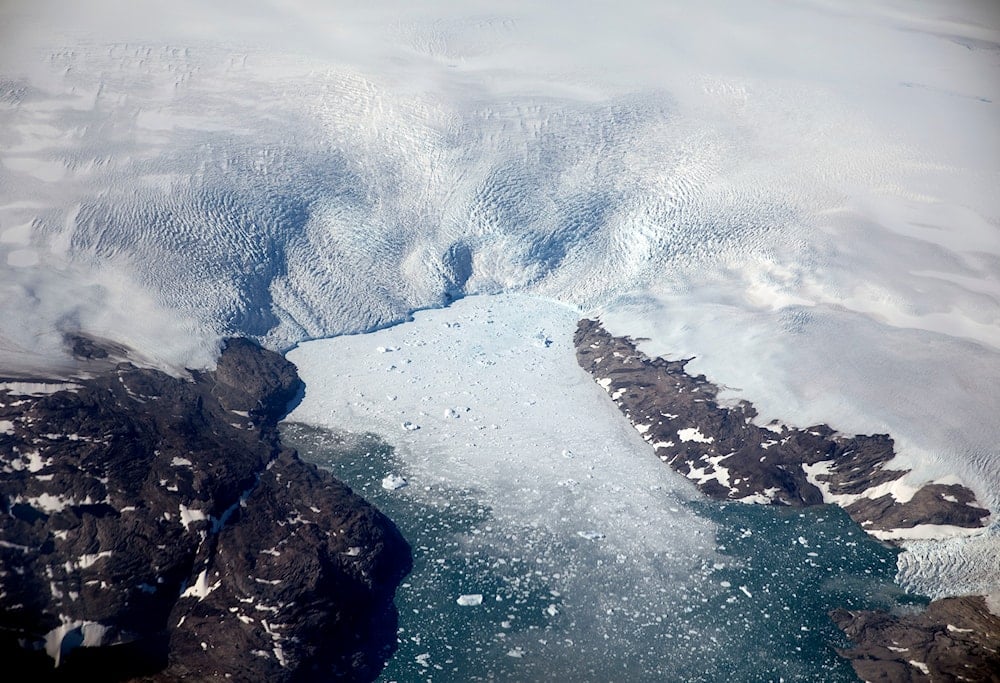World has 2 years of carbon budget to avoid breaching 1.5C target
Only two years remain in the world’s carbon budget to avoid catastrophic weather events and irreversible damage.
-

A glacier calves icebergs into a fjord off the Greenland ice sheet in southeastern Greenland, August 3, 2017. (AP)
The world has just two years remaining in its carbon budget if it is to have any chance of keeping global warming below the 1.5°C threshold, climate scientists have warned. Surpassing this target would intensify catastrophic weather events, further exacerbating human suffering and environmental collapse.
The carbon budget refers to the maximum amount of planet-heating carbon dioxide (CO₂) that humanity can emit while still maintaining a reasonable probability, currently pegged at 66%, of limiting global temperature rise to 1.5°C above pre-industrial levels.
A new assessment by a group of 60 international climate experts concludes that emissions from 2025 onward must not exceed 80 billion tonnes of CO₂, which represents an 80% reduction from the budget estimated in 2020.
Emissions reached a record high in 2024. At this trajectory, the 80 billion ton threshold will be surpassed within just two years. Due to systemic climate lags, the 1.5°C limit, calculated as a multi-year global average, would then likely be breached a few years after the budget is exhausted.
Scientists have long warned that the 1.5°C goal is slipping out of reach due to the continued burning of fossil fuels. The latest data underscores how deeply entrenched the climate crisis has become. Avoiding this level of warming would now require global CO₂ emissions to plunge toward zero within the next few years, an outcome that appears increasingly unlikely given that emissions continued to rise in 2024.
According to The Guardian, nonetheless, scientists stress that every fraction of a degree in avoided warming can reduce harm. “The remaining carbon budgets are declining rapidly, and the main reason is the world’s failure to curb global CO₂ emissions,” said Professor Joeri Rogelj of Imperial College London.
Record-high emissions driving global temperatures
At present, the world is on course for 2.7°C of warming, far beyond the 1.5°C goal. However, a more attainable target of 1.7°C still exists. The current carbon budget to keep below 1.7°C with a 66% probability is approximately 390 billion tons, roughly nine years’ worth of emissions at current rates.
“There is a very high chance we will reach and even exceed 1.5°C and higher levels of warming,” Rogelj noted. “The best moment to have started serious climate action was 1992… but now, every year is the best year to start,” as reported by The Guardian.
Breaching the 1.5°C threshold would likely lock in long-term climate disruptions. In addition to worsening heatwaves, floods, and wildfires, such a rise would require large-scale removal of CO₂ from the atmosphere in the future to restore the conditions in which modern civilization evolved over the past 10,000 years.
Further delay in emissions reductions will not only intensify climate-related disasters but also make solutions more costly and technologically challenging.
Scientists call for immediate action at COP30
Rogelj emphasized the need for countries to commit to substantial emissions cuts at the upcoming UN COP30 climate summit in November. Despite pledges made at COP28 in Dubai to phase out fossil fuels, there is still no significant evidence of a meaningful transition away from coal, oil, and gas, according to The Guardian.
While the expansion of solar and wind energy has helped prevent worst-case scenarios of 4–5°C warming, growing global energy demand continues to drive increased fossil fuel use, thereby accelerating extreme weather events.
According to the study, published in Earth System Science Data, the Earth’s energy imbalance, the surplus heat trapped due to greenhouse gases, has risen by 25% compared to the previous decade. “Things are not only moving in the wrong direction, we’re seeing unprecedented changes,” said lead author Professor Piers Forster from the University of Leeds.
Sea level rise has also doubled in the last 10 years, now averaging 4mm annually, the study found. At 1.5°C of warming, coastal flooding is expected to become unmanageable, triggering what another recent study termed "catastrophic inland migration," according to The Guardian.
Approximately 90% of excess heat is absorbed by the oceans, causing thermal expansion and the melting of ice sheets and glaciers. Dr. Karina Von Schuckmann of Mercator Ocean International warned: “Warmer waters lead to intensified weather extremes and can have devastating impacts on marine ecosystems and the communities that rely on them.”

 4 Min Read
4 Min Read











